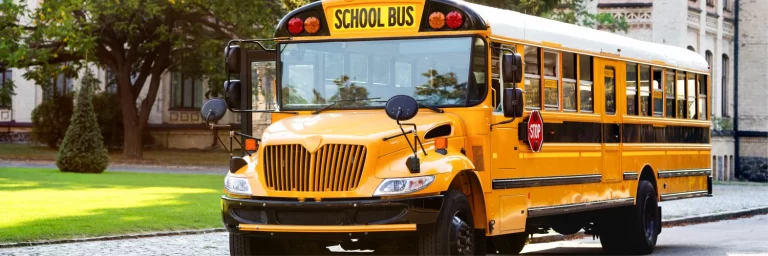Weather has a significant impact on school bus operations and directly affects student transportation and safety. Severe weather conditions and hazards negatively influence visibility, road conditions, and, consequently, bus performance. This is why we cannot overlook the importance of safety strategies for drivers and school administrators. This article will discuss the weather’s impact on school buses and provide precautions for managing these challenges in an effective manner.
How Weather Impacts School Bus Operations
Severe weather conditions can be dangerous for school bus drivers, passengers, and others on the road. For instance, heavy rain and high winds create major obstacles, namely, decreased friction and wet slippery surfaces on the road, decreased visibility due to fog, skids caused by snow and ice, etc. If you or a loved one has been injured in a bus accident due to such hazardous conditions, consulting with a New York City bus accident lawyer can help ensure your rights are protected.
In the next few sections, we’ll discuss specific weather hazards and related challenges for school bus operations.
- Adverse Weather and Bus Delays: Heavy rain, snow, and icy roads are key players when it comes to slowed-down bus schedules. Rain-induced slippery surfaces significantly increase stopping distances that cause delays or changes in routes. Because of these slowdowns, fuel and maintenance costs often increase in school districts. According to the 2022 study by the National Renewable Energy Laboratory, the electric transit bus range decreased by 33% when the air temperature was 25°F, a 30-degree decrease from its ideal conditions of 55°F–60°F.
- Visibility Issues During Fog and Heavy Rain: Fog and rain have a significant impact on visibility. Rain, especially debilitating at night, affects the driver’s perception and produces other visibility challenges due to its action on headlamps, windshields, the road, and road markings. As for the fog, it obviously interferes with a driver’s vision and produces accidents. Additionally, fog reduces the contrast between objects and backgrounds. As a result, objects on the road might seem fainter and less distinct for the bus driver. Visibility issues due to fog and heavy rain cause increased speed variance and ultimately, crash risk. Bus drivers must maintain a longer following distance (three to four seconds) because of a slower braking response.
- Impact of Snow and Ice on Road Conditions: Snow and ice present some of the greatest challenges for school buses. According to the U.S. Department of Transportation, each year, 24 percent of weather-related vehicle crashes occur on snowy, slushy, or icy pavement and 15 percent happen during snowfall or sleet. Snow and ice reduce pavement friction and vehicle maneuverability, causing slower speeds, reduced roadway capacity, and increased crash risk. This is why school closures often occur on days with heavy snowfall to avoid hazardous commutes for students. In snowy conditions, school bus drivers must check if tire tread and brake conditions are suitable for icy roads.
- Wind Effects on School Bus Stability: Wind speeds of 40 mph and above pose a serious risk to the stability of school buses, making it harder for the bus to stay in its lane, especially on open roads and bridges. A well-trained driver can maintain a strong steering control in these situations, as well as reduce speed and stay alert. Some of the school districts use wind monitors to decide when to suspend school transportation services.
School Policies for Safe Transportation During Bad Weather
Clear school policies for safe transportation during bad weather include:
- Weather monitoring for checking local forecasts and alerts
- Communication protocols (calls, texts, social media updates) for notifying parents and students regarding delays, route changes, school closures, etc.
- Driver preparation to make sure the school bus drivers can handle severe weather conditions as the ones discussed above;
- Emergency procedures for having plans for evacuations and shelters
Technology’s Role in Enhancing Bus Safety in Weather Events
Technology plays an important role in improving safety during bad weather. GPS systems are available on many school buses for real-time tracking, allowing schools to keep track of routes and redirect buses away from blocked or flooded roads. Drivers can also keep an eye on blind spots with onboard cameras. In addition, maintenance technologies such as tire pressure monitoring and anti-lock brakes play an important role in keeping vehicles safe during bad weather.
Need Legal Help? Contact an Attorney Today!
Is your child injured in a school bus accident? Whether it’s due to bad weather conditions or driver negligence, Gregory Spektor is here to provide legal guidance. Contact Personal Injury lawyers at Gregory Spektor & Associates and let them help you understand and protect your rights, and receive fair compensation for the physical and emotional damages. Call now for free consultation: 1 (800) 318-8888.
FAQs
Are school buses equipped to handle all types of weather conditions?
While most buses can operate in varying weather conditions, some weather-related hazards such as severe snow, high winds, icy or wet roads can significantly impact safety.
How can schools improve communication during weather-related bus delays?
Schools should use tools for effective communication (phone calls, text messages, emails, social media, etc). Additionally, parents can find real-time tracking apps useful for monitoring bus locations.
How do schools decide whether to cancel buses in severe weather?
Schools decide to cancel buses to keep student safety by monitoring weather forecasts, road conditions, advisories from NWS, etc.
Can high winds really cause school buses to topple?
Yes, high wind speeds above 40 mph pose a risk to the school bus’s stability, especially on open roads and bridges.
Are there safety technologies that help drivers in poor weather?
Yes. Anti-lock brakes, onboard cameras, and traction control are among the safety technologies that assist drivers in poor weather.



